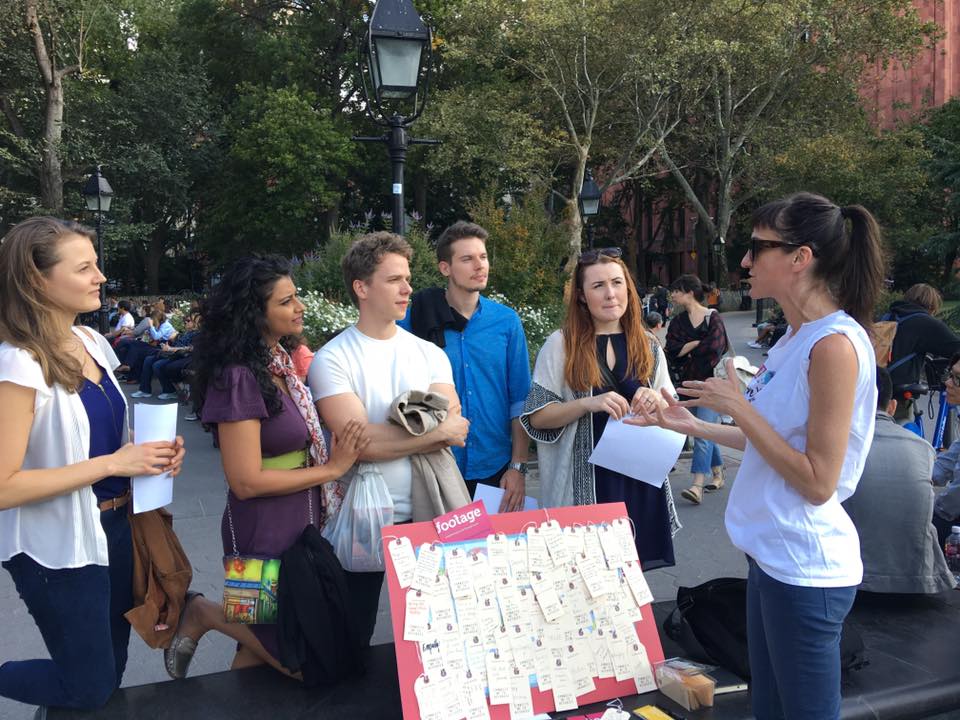Everyone has a voice, but even in a video-and-smartphone filled world, not everyone’s voice can be heard. For many young women around world, their silence is more deafening than words—and often, it’s the people who need to be heard most that are left without access to the technology and resources they need to do so, especially without jeopardizing their safety.
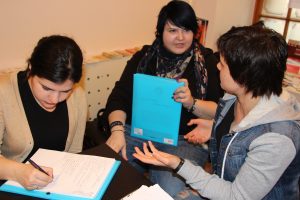
Enter the Footage Foundation, a nonprofit that creates initiatives to help female survivors tell their stories through customized digital storytelling technology, gives them the means to anonymously, and powerfully, speak up in hopes of creating meaningful change.
Dr. Kristen Ali Eglinton, Co-Founder and Executive Director of Footage Foundation, started the organization in order to help women share their experiences surviving violence, of “not belonging” and other issues while protecting their respective identities. The nonprofit has several other sub-programs, like Her{connect}Her and Girl-talk-Girl, that focus on specific groups.
“We know that thousands of young women hear these stories learn they are not alone in their experiences,” said Dr. Eglinton. “Knowing a woman’s story is being used to help young women locally and globally, these storytellers become leaders, and forces of change in the world.”
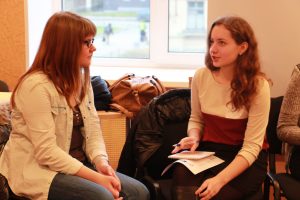 Joined by four other female women PhDs from Cambridge University, Dr. Eglinton and the Foundation bring the program to young female refugees here and overseas and women in the United States living in forced displacement and migration. Their program Her{connect}Her aims to build connections globally among women who feel displaced after having to flee their homes, reaching asylum seekers, economic migrants, refugees, and more living in the UK, France, Sweden, and Greece.
Joined by four other female women PhDs from Cambridge University, Dr. Eglinton and the Foundation bring the program to young female refugees here and overseas and women in the United States living in forced displacement and migration. Their program Her{connect}Her aims to build connections globally among women who feel displaced after having to flee their homes, reaching asylum seekers, economic migrants, refugees, and more living in the UK, France, Sweden, and Greece.
The nonprofit’s proprietary mobile technology is designed and tailored to meet the unique needs of this population. The phone application used for their Girl-talk-Girl (GTG) program, specifically, includes several user requirements around experiences with gender-based violence including a voice changer and animation to secure anonymity.
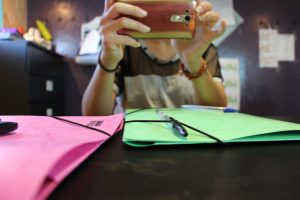
They’ve also implemented a section that offers safe routes home for girls in dangerous areas, and numbers for local hotlines and services where they can call for help.
As a result, women everywhere from St. Petersburg, Russia, Santiago, Chile and Kyiv, Ukraine and New York City are finally able to openly discuss the more difficult aspects of her story alongside other young women living in those cirucmstances.
One woman from Syria shared the following in her piece, which is posted alongside other first-person stories on the group’s Medium page:
Other girls my age are in school now. I am not. They are on their way to do what they want, to go to college, to study what they want. But, I am not in a place to decide what I want to do. This idea is very difficult for me. If I have my permanent papers, I can go to school in Greece. The schools here are not prepared to take you if you do not know the language already. They did not teach me grammar, the basics. They told me to learn the basics, and I can go back.
The Foundation is currently working with young women from Syria and Iraq including Yazidi young women escaping ISIS.
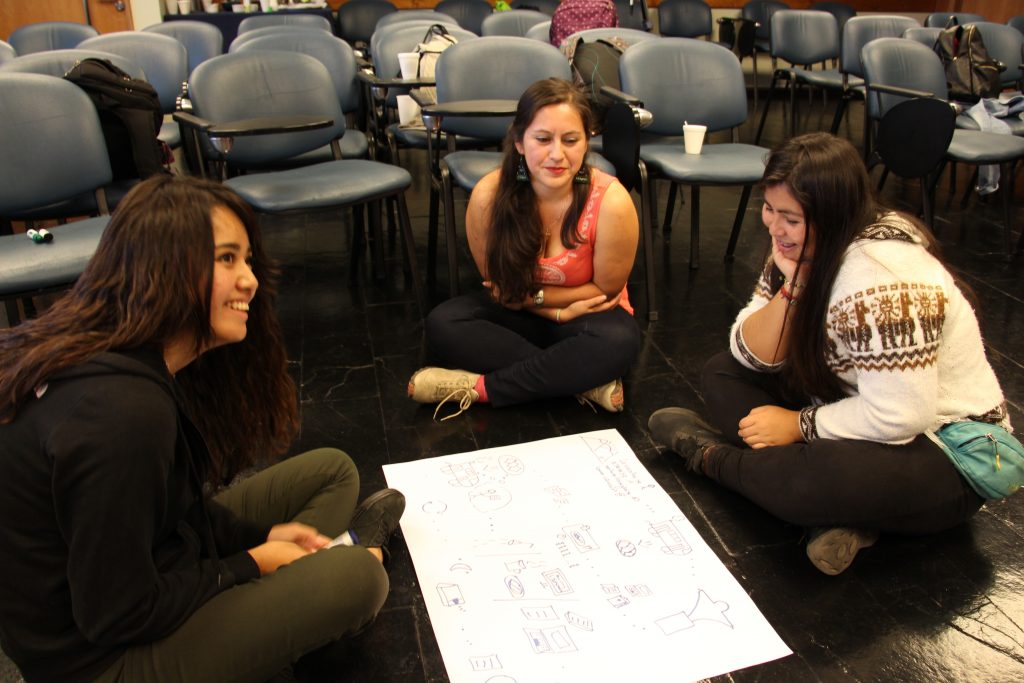
Under its “From Conflict to Connection” campaign, which took place during the 16 Days of Activism Against Gender-based Violence, young women displaced by crisis and conflict talked about their various vulnerabilities in respect to gender-based violence, and the positive impact ‘connection’ has on their lives. That program was initiated with the publication of a photo essay from the Her{connect}Her program in Skaramagas, and stories were released by participants throughout the 16 Days.
From Girl-talk-Girl Ukraine participants:
“It’s as if I have said a final goodbye to those moments in my life, have shelved that situation.”
“I feel relieved, because other participants and the organizers heard my story for the first time. Before that, I felt it was not important enough to be discussed in the group.”
“I was inspired by the girls’ stories, as many had faced violence and discrimination, but found inner resources to fight and win. This is very inspirational.”
In February of last year, the nonprofit worked in Paris, Stockholm, and Leeds in the United Kingdom piloting Her{connect}Her with young women migrants, refugees and asylum seekers from various parts of the world including Cameroon, Saudi Arabia, Somalia.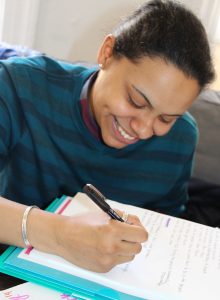 This work was featured in the crowdfunder #OpenPlatformSharedHumanity.
This work was featured in the crowdfunder #OpenPlatformSharedHumanity.
Later in the year, young women in the refugee camp in Greece watched the stories, and Elington and her team will be heading back to the country to bring a year-long program to them through peer-to-peer delivery.
The list goes on, including a campaign called #ConnectsMe led in hopes of getting the public thinking about the ways they connect to the global refugee crisis and its impact.
Using a scientifically measurable approach that they presentedby request at the National Academies of Sciences this year, the team works with women from around the world to help them tell their stories through documentaries and online platforms.
“Our theory of change is based on five measurable outcomes which we refer to as our ‘Drivers of Change’ including compassion and empathy, education, advocacy, awareness, and community and connection,” said Impact Manager Kathryn Weenig.”Based on research, we know that each of these drivers have physiological and psychological benefits at the individual level, and ultimately at the community and global level.”
Such outcomes, she said, also catalyze the United Nations Sustainable Development Goals, in that an increase in compassion is associated with well-being and a positive impact on health.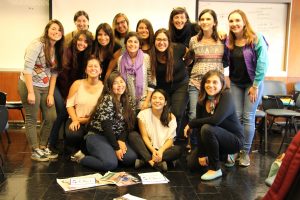
After taking part in facilitated Narrative Labs storytelling workshops,in-house evaluations showed that young women had an increase in compassion for themselves and others, felt a deeper sense of community and connection, and began to envision themselves as leaders and change makers because they felt less alone, less ashamed, and brave enough to come forward.
Later this year, participants will convene with young women from the other Girl-talk-Girl programs in Chile and Kyiv through an online, international seminar.
“We have in place a rigorous monitoring and evaluation strategy which includes surveys and in-depth interviews with all participants,” Dr. Eglinton said. “We know the work is making an impact, and that young women see themselves and their worlds differently.”
To volunteer with the Footage Foundation, Click Here.

